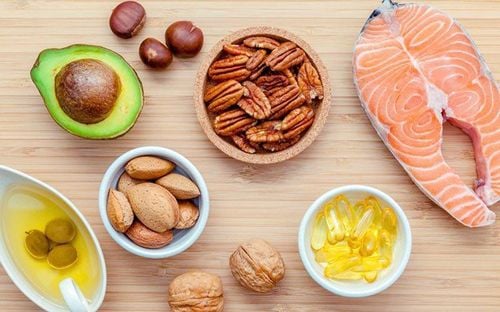This is an automatically translated article.
In addition to the usual physical motor skills, at each stage, children will develop motor skills related to eating. The child's ability to eat also gradually increased.1. Children's ability to eat through each development stage
Children's ability to eat develops according to each stage, specifically as follows:Children can eat pureed or crushed foods, not too hard or too soft when they can't sit firmly, still need support when sitting eat. Children can eat 2-3 times/day. Children who can eat soft foods, not lumps, can eat family food when they are firmly seated. Children can eat 2-3 times/day. Children can eat soft foods, in the form of pellets, small, crunchy lumps, and can eat family food when they can crawl. Children can eat 3-4 times/day. Children can eat foods that are larger in size and of different shapes, especially foods that are long finger-like sticks. Children can eat 3 main meals and 2 snacks/day.

Trẻ sẽ phát triển các kỹ năng vận động thông qua việc ăn uống
2. The development of children's motor skills related to eating
When babies are 6-9 months old, the following eating-related motor skills develop:Can drink from a cup (baby can't hold it yet); Can eat food that is spoon-fed; Children begin to learn to chew. Children know how to bite and chew but can also vomit easily; Children love to hold food with their whole hands. Mothers can let children use their hands to grasp food, but the child will still be clumsy, can crush food and not be able to put it in the mouth correctly. When babies are 9-12 months old, they will develop the following motor skills related to eating:
Children use their whole hands to grasp food more proficiently. At the same time, they can eat with their own hands professionally, especially children know how to use their thumb and index finger to pick up food. Children can try using a spoon. Children use skills to practice eating more often. When children are 12 - 18 months old, they will develop the following motor skills related to eating:
Children learn to hold food by making a fist and to release food by opening their hands. Children can use a spoon to put food in their mouth better but still not fluent. Children can hold their own cups and drink water, but they may still spill water in the glass.

Trẻ có thể tự cầm bình nước uống để phát triển các kỹ năng vận động
3. How to support children to develop motor skills related to eating?
To help children develop motor skills related to eating such as holding food, chewing, picking, ... mothers can refer to the self-directed weaning method, specifically:Grasping food: At the beginning, you can use a serrated knife to cut food into long bars that are easy for children to hold. Once they master it, they will be able to hold more slippery foods. Picking up food: Mothers can cut foods smaller so that children practice using their thumbs and index fingers to form pincers. At this stage, mothers can use a variety of foods with different processing methods such as frying and stir-frying to increase the variety of dishes for the baby. Holding spoons and spoons: When children's ability to grasp food and pick up their fingers is proficient, mothers can practice for children to start using spoons and spoons by letting them play with cups, bowls and spoons. Holding a glass to drink water: At the beginning, you can buy a cup with two handles on both sides to train your child to hold a cup to drink on their own. In summary, during the weaning period, children will form and develop motor skills related to eating such as grasping food, chewing and swallowing, and using cups. Parents need to pay attention to the child's developmental milestones to support them and help them love eating.
To help children reach important developmental milestones. In addition to the nutritional diet, parents should supplement their children with supporting products containing lysine, essential micro-minerals and vitamins such as zinc, chromium, selenium, and B vitamins to help fully meet their nutritional needs. in children. At the same time, these essential vitamins also support digestion, enhance nutrient absorption, help improve anorexia, help children eat well, and develop comprehensively.
Please regularly visit Vinmec.com website and update useful information to take care of your baby and family.













